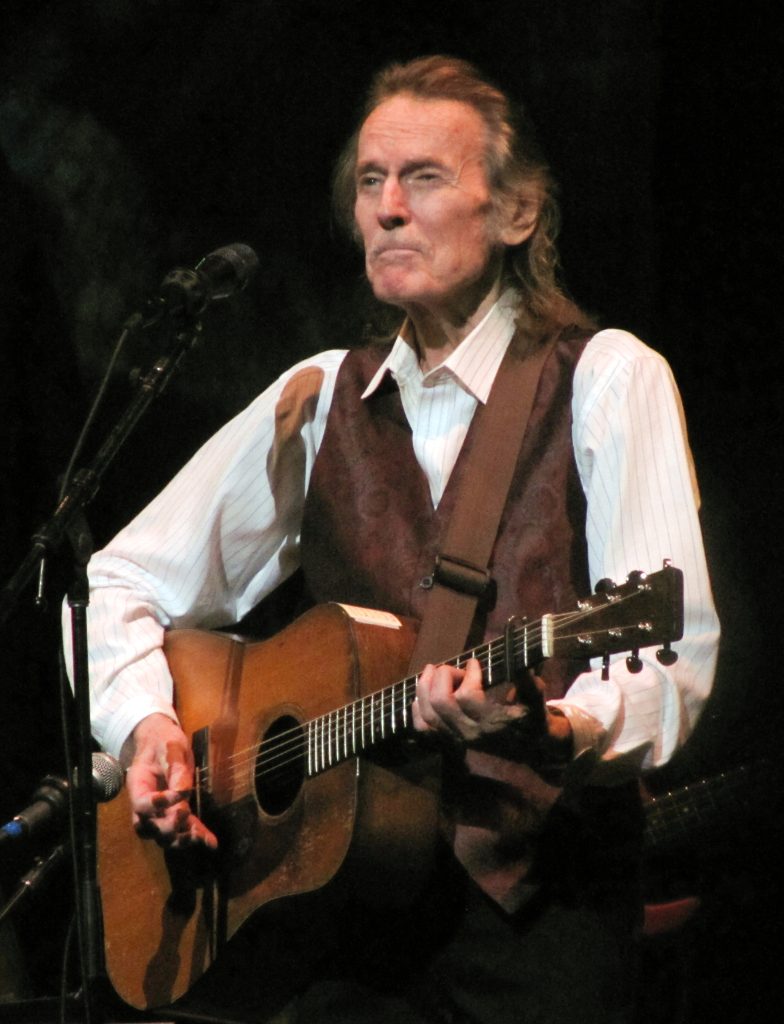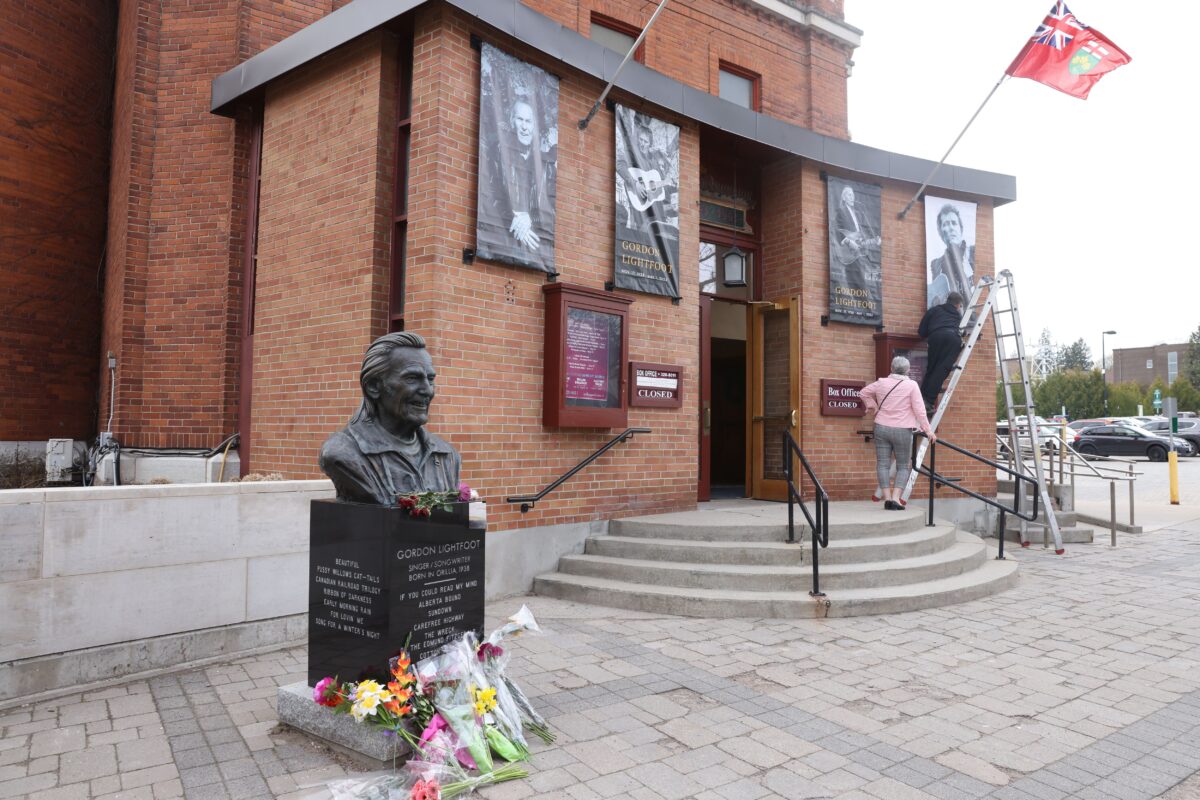
by Geoffrey Clarfield
Singer-songwriter Gordon Lightfoot passed away on May 1, 2023. He was 84 years old. He will be remembered as the foremost Canadian singer-songwriter of his age as his songs expressed the longings, fears, hopes, joy, and pain of a generation of Canadians who came of age after World War II.
Lightfoot was raised in a middle-class family in Orillia with his sister and two parents in a fine two-story house in town. He was a good student, a gifted athlete, and a boy soprano who sang in church and at local singing festivals like the Kiwanis.
He was of Scottish descent and remembered singing an Irish folk song at one of his childhood gigs, portents for a nascent balladeer. His parents loved him. His father was his buddy, and they went fishing together, but as Lightfoot once said later, “My mother is my biggest fan.” She encouraged all and every step of his career.
He eventually moved to Toronto and worked in a bank. However, the growth of an indigenous Canadian media swept him up and he became a dancer on the TV show “Country Hoedown” and a singer on TV in a duo. As he was the one who wrote all the songs, he eventually broke free and started performing in clubs in Toronto, which eventually turned into a steady paid gig at the Riverboat on Yorkville Avenue, managed and owned by entrepreneur Bernie Fiedler.
Before that he spent two years in California at a College studying singing, songwriting, composition, and arrangement, and singing from the Great American Songbook in the college’s jazz orchestra. The evidence of this training showed up later in his phenomenal stage presence and his ability to evoke the story in any good song.

Lightfoot was the right person, at the right time, in the right place, playing the right music as upwardly mobile Canadian baby boomers were rediscovering the vernacular music of North America’s “folk”—farmers, fishermen, railway workers, hobos from the Depression, and the like. One can imagine that he had his ear tuned to the various radio stations in Canada and the States that were playing the blues and ballads of Anglo and Afro America and which inspired singer-songwriters like Bob Dylan, who later befriended Lightfoot and once said that there is not a Lightfoot song that he does not like.
Fellow Canadian singer-songwriters Joni Mitchell, Neil Young, and Ian and Sylvia Tyson were influenced by Dylan, each in their own way, and as they were still based in Toronto welcomed Lightfoot into their social networks and did covers of his songs.
These talented post-war boomers became his “musical mates” and helped him enter the music business of the Sixties where he was able to maintain a musical presence and a growing audience in Canada and the United States. Ultimately, Dylan’s manager took him on and helped him build an international reputation.
If you look back at the scores of his songs, the albums, concert tours, the music, and the prestigious awards which he earned over time, the arch of Lightfoot’s career looks like an investment portfolio that grew consistently with compound musical interest. But that was not the case.
Lightfoot’s personal life was turbulent. He was an alcoholic for years and had six children from three different partners. He was a “party boy” and gregarious host who had difficulty saying no to amorous engagements. Many of his most evocative songs emerged from actual relationships gone sour. Through his songs he wore his heart upon his sleeve.
While the rest of his generation and those somewhat younger than he were trying to make sense of the consumer society, feminism, the drug culture, and eventually for many, marriage and children, his songs reflected their own emotional struggles which perhaps were lived on a less public and less dramatic canvas but were no less as intense or meaningful. Lightfoot’s lyrics and melodies reflected and evoked this turbulence.
Lightfoot was a professionally trained singer, songwriter, and a fine guitarist and arranger. He chose to sing in his own Orillia, Ontario, accent. He never took on the fake southern twangs of a Shania Twain. His guitar playing was supportive of his melodic delivery, and when you see him on YouTube you are sure (as he explained many times) that he was giving every song and performance his “all.”
Although he had many “hits,” for me two songs stand out among all others. The first is his sad lament, “In the Early Morning Rain” which evokes the emotional suffering that so many Canadians have felt when time and distance separate them from the ones they love, or want to love in this vast and often lonely country where, unlike Americans, the next regional capital is not a two-hour drive away but may hours by jet plane.
In the early mornin’ rain
With a dollar in my hand
With an aching in my heart
And my pockets full of sand
I’m a long way from home
And I miss my loved one so
In the early mornin’ rain
With no place to go
The other is the Canadian Railway Trilogy, a series of lyrics and melodies that he composed when Canada became 100 years old in 1967. As a 14-year-old wannabe singer-songwriter, I remember reading the boring material which the government provided to try and enthuse my fellow citizens that the railway gave birth to the Canada that we had been born into, and had inherited from veterans like my father who had defended us during World War II. Lightfoot turned it into poetry:
There was a time in this fair land when the railroad did not run
When the wild majestic mountains stood alone against the sun
Long before the white men and long before the wheel
When the green dark forest was too silent to be real
Gordon Lightfoot is no longer with us, but his songs live in the minds and hearts of millions of Canadians. They are in so many ways an artistic rendering of issues that resonate with Canada’s baby boomers. No doubt, a younger generation of Canadians will find their own troubadours who reflect the feeling tone of their own lives and time.
But as far as I am concerned, Gordon Lightfoot is my very own authentic Canadian troubadour.
First published in the Epoch Times.
- Like
- Digg
- Del
- Tumblr
- VKontakte
- Buffer
- Love This
- Odnoklassniki
- Meneame
- Blogger
- Amazon
- Yahoo Mail
- Gmail
- AOL
- Newsvine
- HackerNews
- Evernote
- MySpace
- Mail.ru
- Viadeo
- Line
- Comments
- Yummly
- SMS
- Viber
- Telegram
- Subscribe
- Skype
- Facebook Messenger
- Kakao
- LiveJournal
- Yammer
- Edgar
- Fintel
- Mix
- Instapaper
- Copy Link










2 Responses
One of my favorites is “Ten Degrees and Getting Colder”. It nails the feel of hitchhiking and the allure of further on.
The Edmund Fitzgerald and her crew will live forever because of Gordo.
Thankyou Gordo.
Superb song.